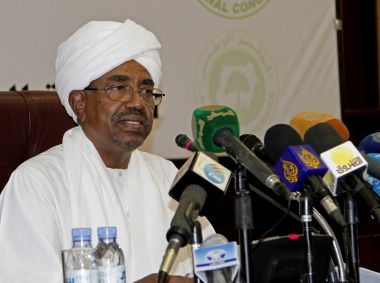Meriam is free, but for many Sudanese Christians, the battle for freedom has only just begun

Meriam Ibrahim is nearly free. Having been released from prison with her four week-old daughter and 19-month-old son earlier this week, she was then re-arrested at the airport and detained for an agonising three days. She's just been released on bail following alleged irregularities with her travel documents. Her name made the headlines over the last month as the world focused on Sudan, shocked and dismayed that a judge could sentence a pregnant woman to 100 lashes for adultery and death for alleged apostasy.
For months she withstood pressure to return to 'faith of her fathers.' She endured imprisonment, shackles, separation from her husband and accusations of adultery - all because the court of first instance ruled that because she was born to an absent Sudanese Muslim father, she was therefore a Muslim. Meriam defiantly said at her trial: "I am a Christian," and testified of being brought up in the Christian faith by her Ethiopian Christian mother. When she was sentenced, there was uproar against the injustice. In Sudan, protesters gathered outside the court and both Muslims and Christians spoke out against the decision. Around the world millions heard of Meriam's case and joined in protest. Just six weeks after receiving her sentence, the appeal court overruled the initial decision. Meriam was freed (albeit now on bail for alleged forgery of travel documents) but we're inching closer to seeing justice being done.
Questions still linger over the right to freedom of religion or belief for all of Sudan's citizens. No one has been convicted of apostasy under the 1991 Penal Code by a court and then had the sentence quashed. The basis of Meriam's appeal was that article 38 of Sudan's Interim Constitution guarantees freedom of religion or belief for all citizens, including the right to declare and manifest a religion and guarantees freedom from coercion to adopt a faith.
The constitution also states that Shari'a law is a source of legislation but not its only source. While this constitution remains in force, freedom of religion or belief in Sudan is guaranteed - at least in theory. However, since 2010 President al-Bashir has stated his intention of drafting a new constitution that will be based wholly on Shari'a law. If this happens, and without guarantees for freedom of religion for all and exceptions for non Muslims, the ground won by Meriam's case would be lost immediately.

Meriam's case aside, all indications are that the situation for Sudan's Christians has worsened since South Sudan seceded. Several church buildings have been confiscated by the state while others have been destroyed with impunity. Christians have been detained and interrogated by the National Intelligence Security Service (NISS), with several who are non-Sudanese being deported at short notice, and hate speech against Christians is aired without fear of consequence. There are underreported cases of individuals who have exercised their right to change their faith but are often pressured into recanting due to the deep and abiding societal hostility to conversion from Islam.
While Meriam's case has been a focal point enabling public discussion in Sudan about freedom of religion or belief, unless the government meaningfully engages with its responsibility to uphold this right for all its citizens, both in practice and in the drafting of the new constitution, and undertakes to prosecute those who advocate hatred and violence against religious minorities, more cases like Meriam's will be repeated all across Sudan.
Kiri Kankhwende is the press officer for Christian Solidarity Worldwide.











